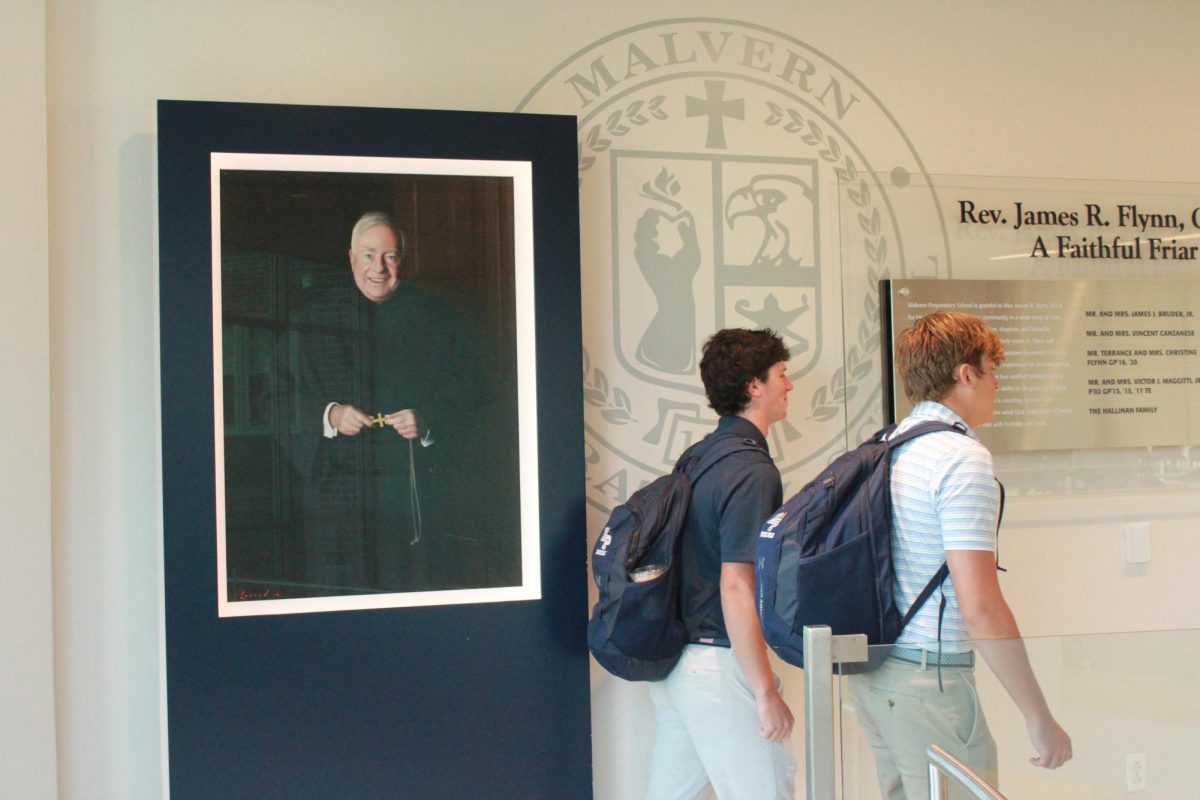Good grades are on the rise and bad grades are the decline at Malvern and nationwide. What does this mean?
Most of the students at Malvern try for high grades. However, what does it mean for a school when the number of students achieving those high grades each year is on the rise?
The Malvern Prep Class of 1999 graduated with 45.56% of the grades being a B- or lower in their junior year. The 2014 graduating class had only 9.18% of its grades B- or lower – a near 80% decrease in 16 years.
The average percent of the students graduating with a cumulative GPA over 4.0 since 1998 increases at a rate of .25% annually, but has been anywhere from 5.4% in 1998 to 17.7% in 2007.
To collect this information, the Black Friar Chronicle analyzed the college profile grade distribution for every class from 1999 to 2015, excluding 2006 and 2011 due to a lack of profiles for these years.
To find the percent of students graduating for Malvern with a 4.0, we examined the 4.0 Club plaques on the walls of the counseling hall in Tolentine Hall from 1997 to 2013.
It should be noted that Theology was omitted from grade distribution charts on the college profiles from 2002-2013.

“It’s totally standard,” said Director of College Counseling Mrs. Emily Feeney. “I think if you took a smattering of high schools across the country and did the same type of analysis that you would find the same thing,” she said referencing our grade distribution.
Feeney pointed out that grade distribution is an ongoing conversation in high school and higher education. “Should a C – which falls right in the middle – be average,” questioned Feeney.
“Really, it’s skewed,” said Feeney. “Probably a B-ish is really the average. Even a B+ if you look at the distribution here, but that’s not uncommon among high schools in the US, among our peer schools. It would look very recognizable to an admissions officer,” she said.
“I would say at the college level, too, you would still probably find the same kind of grade distribution shift. It’s pretty common,” said Feeney. “It’s not really alarming, and I don’t see it as a problem for students as they apply for college.”
According to Feeney, a school’s profile is uploaded electronically to colleges along with student transcripts. These profiles provide information about what is offered at a school and what grades students typically get in courses, in order to provide admissions counselors with some standard of comparison.
As an example, Feeney explained that at Episcopal Academy a student can take as many APs as s/he wants, with almost no restrictions. Malvern has limits on the number of APs a student can take, and prerequisites for some honors and AP classes.
“So, you kind of have to know the context of the high school to know whether a student is challenging himself when you look at that transcript,” she said.
“[The school profile] is used to assess the rigor of the curriculum,” said Feeney. “Then also to get a feeling for what the grades mean that they are seeing on the transcript in terms of how well that student really did.”
College Counselor and English Teacher Mr. Rich Roper confirms how the school profiles are used. “This is the best way so far to give them a resource to judge our kids in reference to each other and the coursework we offer,” said Roper.
“There is an ongoing debate that is probably 40 years old about grade inflation,” said Roper. “We tend to grade higher knowing that colleges are looking for higher grades. I think we fight it as much as we can, but it’s still there in the back of all of our minds”
“There’s no question at all that grades are subjective,” said Upper School Head Mr. Ron Algeo.
Algeo is also not alarmed by the overall increase in grades. “There is other standard data we use to evaluate ourselves – AP scores, SAT scores, and surveys that we do of college students.” Algeo pointed out that Malvern asks alumni who return to campus how they are doing and whether they felt prepared. “The data we are getting back from the college students is very good,” said Algeo.
Algeo pointed out that Malvern’s AP scores are “phenomenal” compared to the national average, and that SAT scores are also very good.
Algeo pointed out that Malvern has a responsibility to prepare students for college. “We want them to be able to apply to the best colleges they can. Those colleges are asking for GPAs, and if our students can do well there, that’s beneficial,” he said. “We have a responsibility to provide that for our students and our families.”
But Algeo believes the learning is the most important part of any grading system. “We could do whatever we want to fix the GPAs, but no one is going to do that to sacrifice learning,” said Algeo.
The discussion of the value and meaning of grades has become a huge conversation among the educators at Malvern after Algeo sent out an article called What Grade Should They Get. It highlights that the exact same performance could mean a B in one class or an A in another. The author calls for teachers to think more about the way they grade students than the percentage that shows up in the gradebook.
The concept of removing grades is being tested at Malvern with Larry Legner’s second semester Moral Theology class of juniors.
“For the third quarter, we’re not going to have grades,” said Legner. “We’re going to do – pretty much – everything that I would have done anyway; just I’m not going to mark it and put a 90 at the top of the page, or an A, or B. They’ll get comments written on their assignments.”
However, the students will have grades for the fourth quarter, and be given the same exam they normally would be given.
With Algeo’s help, Legner wants to examine the final exam results of this class with past classes to see if students really learned better by not having a grade attached.
“If it stays the same or goes up, we may have just struck gold, and that to me is awesome,” said Algeo.
Whether students will really try if grades aren’t attached is the real question. Mr. Legner conducted an informal survey in his class by asking his students whether they learn for the grade or for learning. Most of the students said they learn for the grade, or that it depends on the subject.
“If I’m not putting a grade on that, do you care?” wondered History Teacher Mr. Andrew Burke. “You might care, but there are other students that are like ‘I’m playing sports, video games, and I’m going out with my girlfriend so I am not busting my butt on this essay.”
The possibility of eliminating grades on a large scale is not plausible in the near future at Malvern. “Ms. Randle and I have been pretty vocal about saying that we think without grades it’s really going to disadvantage our students in the college application process,” said Feeney.
“We’re a college preparatory school and we want to get you guys prepared for colleges so we understand that is part of our responsibility,” said Algeo. “Unfortunately, or fortunately, grades are a huge part of that.














